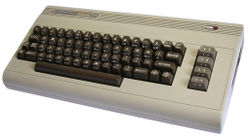1984: The ZX Spectrum
 Although 1984 wasn't the year the Sinclair ZX Spectrum came out, it is very difficult for me to mention the '80s and not mention the Spectrum. Yes, the Spectrum seemed to have that much of an impact.
Although 1984 wasn't the year the Sinclair ZX Spectrum came out, it is very difficult for me to mention the '80s and not mention the Spectrum. Yes, the Spectrum seemed to have that much of an impact.The ZX Spectrum did help to revolutionise the home computing market, and was the Crow’s first foray into computing and software. When men of a certain generation gather in numbers to talk about “in my day we used to make our own entertainment”, they certainly cover the gamers of the 1980s. There were magazines and books a-plenty in this era encouraging the young software engineer to design and code his own games, oh the fun to be had inserting hundreds of lines of code only to spend even longer looking for the line of code which caused it to crash. Debugging 101!
Over in the USSR illicit networks had been forged in these cold war days to exchange ideas of political and religious freedom. Here in the UK it was all about illicitly exchanging pirated Jetpack, The Hobbit and Jet Set Willy in the school playground!
Because of the ease of programming these machines new games were easy to make, often requiring just a single developer (compare that with the cast list for the latest Final Fantasy game). The result of this is that people remember this as a kind of golden age of gaming and for good reason – people were able to realise new ideas for games, and develop them quickly and with little cost. This meant there was a huge spectrum (excuse the pun) of games to choose from, compare that with current games development where focus groups force new games into set genres – “first person shooter”, “platform”, “driving simulator” …
Anyone who ever played Dictator on the ZX Spectrum - where you ran a country trying to keep different groups at each others throats, kept strong groups allied to you, and played the Russians and Americans against each other - will know this game has never been emulated or equalled in its’ gameplay.
But it wasn’t all fun – games came for the ZX Spectrum on tape only in these days. This was a slow business, finding the right load position on a tape, and then waiting the 5-10 minutes for the machine to load up. Anyone from this era can hum along here to the sound of a loading spectrum (sounds eerily like the sound of dialup, itself a sound of a bygone era).
 Its’ main competitor was the Commodore Vic 20 and Commodore 64 machines. But there is something fundamentally British to enjoy about the Spectrum, like the Mini car a kind of quality where its’ limitations gave it a form of character. The rubber keyboard was unique amongst computers of its era, which on the whole used keyboards not too dissimilar to the modern day ones. The sound was a kind of naff beeping through a tiny speaker compared to channelled through the TV. At a maximum of 48k, it didn’t have the largest memory. And the lack of cartage loading or floppy disk drives available for the Commodore had left Spectrum users loading by tape.
Its’ main competitor was the Commodore Vic 20 and Commodore 64 machines. But there is something fundamentally British to enjoy about the Spectrum, like the Mini car a kind of quality where its’ limitations gave it a form of character. The rubber keyboard was unique amongst computers of its era, which on the whole used keyboards not too dissimilar to the modern day ones. The sound was a kind of naff beeping through a tiny speaker compared to channelled through the TV. At a maximum of 48k, it didn’t have the largest memory. And the lack of cartage loading or floppy disk drives available for the Commodore had left Spectrum users loading by tape.And yet the ZX Spectrum is somehow one of the best loved computers of all time, somehow in the minds of those who owner them these flaws turned somehow into indicators of the character of the machine. Other, arguably better machines tried to run against it like the Oracle, the Dragon 32 and the Acorn, but were buried by it.
A measure of the enduring popularity of the machine? Just go into www.ebay.co.uk, and enter “ZX Spectrum” into the search window, and find out how many working Spectrums are still out there for sale!
In 1984 Sir Clive Sinclair the inventor of the Spectrum seemed to have ushered in a golden age of computing and technology for Britain. Alas, the C5 and the QL were just around the corner…
You can look for ZX Spectrum emulators here!
All material copyrighted as bullsh*t ...


1 Comments:
can't even imagine how slow they'd seem today.
11:52 am
Post a Comment
<< Home